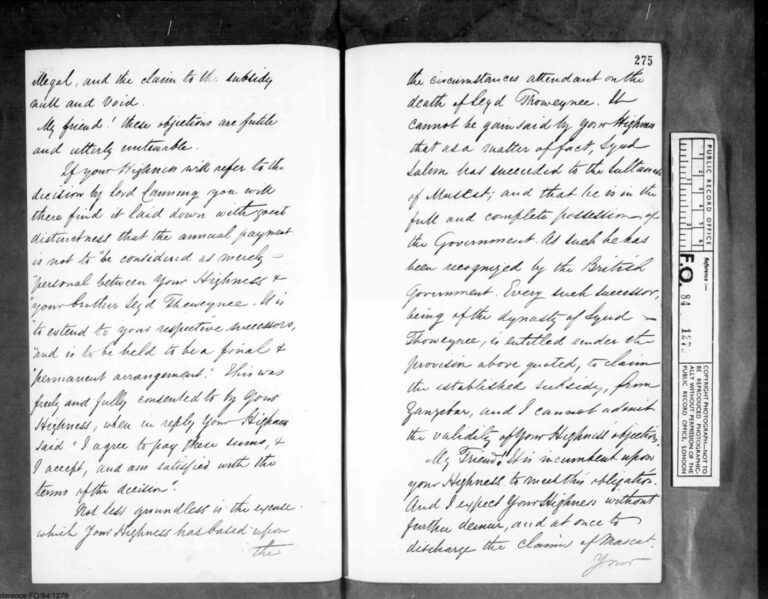Content note: This blog post contains descriptions of the trade of enslaved people in the 19th century.
This is the second part of a two-blog series following a placement I undertook at The National Archives in 2021 during my PhD at King’s College London. The National Archives invited me to help them better understand the content and structure of the records of the Foreign Office’s ‘Slave Trade Department’.
Records include FO 84 and FO 881 record series, which hold correspondence with officers of the ‘Slave Trade Department’ in the latter half of the 19th century. At this time, the efforts of the British Government to suppress the trade in enslaved people were being concentrated more on the Indian Ocean.
What are the records of the Foreign Office’s ‘Slave Trade Department’?
Under the Slave Trade Act of 1807, the, ‘Purchase, Sale, Barter or Transfer of Slaves… in, at, to or from any Part of the Coast or Countries of Africa’ was ‘abolished, prohibited and declared unlawful’. Although practices of slavery continued in the British Empire after 1807 in a variety of ways, over the following decades the British government invested increasingly heavily in suppressing the enslavement of Africans for sale overseas.
Between 1841 and 1882 the ‘Slave Trade Department’ of the Foreign Office was responsible for international treaties against slavery, and for agreements with foreign powers to seize the ships of those engaged in the trading of enslaved people.
Much of the correspondence of the department was with the ‘Slave Trade Commissioners’. The Commissioners worked with representatives from other countries to adjudicate cases relating to seized ships; dividing the profits from selling the ships and their goods, and liberating the enslaved. These Mixed Commission Courts were held in Africa, North, South and Central America, and the Caribbean.
In the first post, I explored what the series can tell us about the experiences of the enslaved. In this second blog, I’ll explore how FO 84 can offer a glimpse into the local politics of trading areas, as seen through the lens of diplomats advancing and protecting British interests as defined by the 19th-century colonial government.
Tensions between Zanzibar and Oman
First, consider a series of letters between Henry Churchill, the consul in Zanzibar (from 1865–70), a hub of trans-oceanic slaving activity, and its Sultan, Sayyid Majid bin Saïd al-Busaidi (reigned (r.) 1856–70) (FO 84/1279, ff, 269-290).
The letters, dated to September 1867, unveil a dispute between Sultan Majid of Zanzibar and his nephew the Sultan of Muscat, Salim bin Thuwaini al-Busaidi (r. 1866–68). It regards the death of Salim’s father and predecessor Thuwaini bin Saïd al-Busaidi (r. 1856–66), who was also Majid’s brother. Majid accused Salim of patricide: assassinating Thuwaini for the sake of assuming control of the Omani throne.
The British Government had previously brokered an agreement between Majid and Thuwaini in which the former would pay an annual subsidy to the latter. Following Thuwaini’s death, Majid refused to pay the approved sum to Salim. Consequently, the Viceroy of India, Sir John Lawrence (from 1864–69), threatened Majid with the withdrawal of British support in no uncertain terms.

Churchill, fearing a war between Zanzibar and Oman following Majid’s offence at the tenor of Lawrence’s dispatch, manufactured an indirect method of payment that would ‘spare him the shame that was being imposed upon him’. In a separate letter to the Foreign Secretary Lord Stanley, Churchill postulates that the British Government could allow Majid to reject the subsidy if he were to agree to ’cooperate with us in the suppression of the slave trade’.
‘The laudable end which you have in view’
Such stories pervade the diplomatic disputes which characterise the FO 84 and FO 881 records. For example, in 1870 after an enslaved person escaped a Turkish schooner (see footnote 1) and was brought into the care of the British Consulate, the Secretary of the British Embassy to Turkey, Mr. Barron, complained to the then Foreign Secretary, Lord Clarendon, that authorities in Tripoli (in modern-day Libya) were failing to co-operate with Consul-General Drummond Hay.
Clarendon replied that he had asked the Ottoman Grand Vizier to impose ‘stricter measures against slave dealers’, but the Consul should confine himself to alerting local authorities of ‘any fresh instances of slave dealing’, to avoid the impression that British consulates or embassies had ‘become asylums for runaway slaves’. He asks Barron to respect the prejudices of peoples outside the British Empire and the diplomatic difficulties of the British government ‘the laudable end which you have in view’. In other words, ‘this government has by law abolished slavery within its dominions but cannot safely carry out an active abolitionist policy’.
Barron did not think Clarendon’s response was good enough, arguing that the UK was already pursuing an active abolitionist policy and that it did not help that the British Viceroy of India was himself sponsoring the Azizieh Company, an organisation trafficking enslaved people. This led to an intensifying exchange in which Clarendon reminded Barron of his rank (catalogue ref: FO 84/1324, ff.54-77).
These two stories demonstrate to what ends these records are highly informative sources for understanding the internal politics of the Foreign Office in the late 19th century, and the international disputes the department was involved with. From dealing with family rivalries and overcoming financial arrears, to managing collegial disagreements, the letters contained within FO 84 and FO 881 records paint a vivid picture of the many kinds of politics involved in both supporting and hindering the suppression of the Indian Ocean Slave Trade in the latter half of the 19th century.
Rhys Sparey is a PhD student from King’s College London, who spent three months working with The National Archives on a placement in 2021 funded by the London Arts and Humanities Partnership. Read Rhys’ previous blog on what these records can tell us about the experiences of the enslaved.
Footnotes
- A schooner is a type of large sailing vessel popular among the British Navy and characteristic of long-distance sailing in the 18th and 19th centuries.